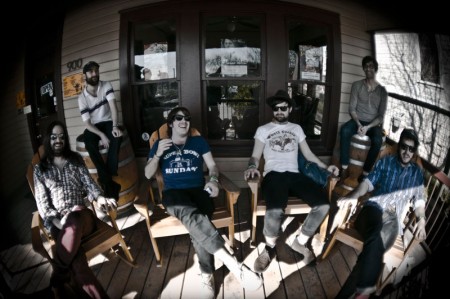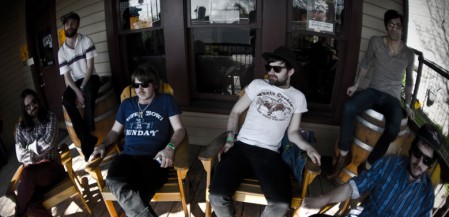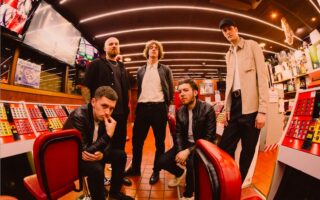Born out of the ashes of lead singer Reid Morrison and drummer Tomer Danan‘s previous band, Morrison Steam Fayrelaid, five-piece The Treetop Flyers‘ chilled, laid-back brand of rock was always going to be a perfect antidote to the frenzied mood which can engulf Austin during the SXSW Festival.
They claim to have two albums worth of songs ready to go, and released their debut EP ‘How To Bury The Past‘ last September. A wonderfully understated slice of Americana, the record calls to mind Seventies-era Neil Young, while songs such as ‘Mountain Song‘ and ‘Old Days‘ are tracks which would have Paul Simon beaming with pride.
(Download Mountain Song Mp3)
We had a chat with the band at the SXSW festival to discuss the origins of the group and it’s sound, where they would like to record their future material, and among other things, the many high-points of driving through Pennsylvania…
Live4ever: We read something about you guys which said they should make up a genre just for you, how do you feel about that?
Treetop Flyers: Pretty cool, though you could have a problem where you step out of your own created genre, you could reject your own genre. We try not to bang on about genres anyway.
L4E: So you generally don’t feel comfortable if you get put into a genre where someone says ‘these guys sound like Mississippi Delta’ or something like that?
TF: You always strive just to make the music you want, but we understand that people always have to label something and always have to find a way to describe your music to other people. The problem is that sometimes people get really lazy with the way they label things, so you get stuck with what you get stuck with and there’s not much you can do about it. Country Soul is a pretty good label though to be honest, we can do a lot with that! I think coming over to the US as well as an English band described by that term means Americans often say ‘what, you’re not country music’, and especially in the UK as well because no-one else is doing it, so I guess it could be a good thing. Do you know what label we are? Maybe Country Hip-Hop – we’ve come on to hip-hop quite a lot at our gigs, so it’s obviously sub-conciously played a big part in our sound!
L4E: Did you all meet in London or are you from all over the UK?
TF: Yeah, I’ve (Reid) known Sam for a few years and Laurie and Matthew. I was in a band with Tomer which went a bit wrong for different reasons, so we started a band together, and with knowing the other guys for a while and being into the same sort of stuff, we just decided to try something. We were all on the same circuits and met each other at soundchecks when we were on the same bill. We all the same sort of music so we just thought ‘let’s try and do it’.
L4E: So you all played a bluesy/country style before you got together?
TF: Yeah, if we walked into each others front rooms and saw our record collections, we’d want to be friends, and we probably don’t have that many other friends who have that type of music.
L4E: What would we find in your record collection?
TF: Well obviously loads of country, but I (Reid) love soul and reggae, and Laurie loves metal, you can take something from everything. It’s weird growing up in London because everyone’s very ‘sceney’ over there and they have five minutes with each music, whereas we never went into a particular genre because everyone was always listening to stuff that the scenesters were into – we took a bit of everything whereas as some people just pigeon-hole themselves and five minutes later they like something else. So the record collections have grown pretty broad over the years. We get the impression in America that there’s more room to take time to appreciate music; if you’re not at the top of your game in England or you’re not number one, or the big name of the moment, you’ve got a two year window and you’re pushed and you hear this band everywhere – and then you’re nowhere. In the US there’s a lot more scope to mature because of the scale of the country, it’s a lot harder work. There’s room for everything, there’s probably a radio station for everything. The audiences here are genuine music lovers and you get a more honest, non-biased crowd.
Roses in the Yard , Live at SXSW 2010
L4E: Some of the bigger bands from England have been quoted as saying that it’s always great to play in front of bigger crowds in the States because it makes you play better because you know that the people that are there are going to know if you make a major mistake.
TF: Yeah, also a lot of it came from the US in the first place. We saw a couple of bands last night, and we’re different to them and I was watching them thinking ‘I think we need to start again and get a lot, lot better!’ They were so good and also as a player, it’s a bit geeky, but people look after their equipment here, they focus on their tone, and that’s something we’re all very much in to. It’s the tools of your trade, it’s your voice when you play.
L4E: We read something on Clash Music. They asked you if they could compare you with Fleet Foxes… (the band erupts in laughter as everyone points at ex New Yorker and drummer Tomer Danan who is left explaining)
TF: Ah, ‘We rock harder!‘ It was a much longer answer and they cut it down! The point was we were trying to distinguish ourselves from them, people want to stick a label on you and you want to do your best from the beginning to try and avoid being compared to the thing of the moment, because then people aren’t going to give you a second chance, so you have to try and stand out and be your own thing in the best way you can. So maybe with comments like that you have to be a bit defensive because people are going to do their best to try to describe you by using the closest thing that’s popular. An example of this would be about ten years ago when you had Oasis and Blur and they’re put head-to-head, probably because someone was making a load of money, and it created a situation where ‘you’re like this, and you’re like this’, and it was actually completely irrelevant. Throughout the history of music you’ve got people who write multi-part harmonies and we’re doing that kind of thing, a lot of other people are doing that kind of thing. Everybody wants to compare multi-part harmony bands to Fleet Foxes, but then Fleet Foxes came after Midlake who were doing that kind of thing, and Midlake came after God knows how many bands including The Beach Boys. When a band comes out that’s doing something a bit different then that does open the door for other people who are doing that sort of stuff, which is a good thing. Fleet Foxes are sort of a benchmark – they became huge so you get compared to them. It’s easy for people to say what you sound like before they’ve even heard you, but it’s a bit unfair sometimes. At the end of the day, we love music, we love making music and we just want to be taken for what we are.
L4E: Can you tell us a little bit about your recording process? We hear you are big analogue fans.
TF: Yeah we love recording on tape and most of our recordings are done as live as they can be. Pretty much stick us all in a room and press record. We might do some acoustic guitar overdubs, and the main vocals and harmonies. We’ve done one song which we’re going to put out as a b-side which apart from the backing vocals is all live – Reid’s vocal is live, we were all in the room together. There’s no cutting, pasting, fixing vocals, it’s one solid take apart from the backing vocals. We never put different takes together; when we record, even when we do overdubs, whatever goes out is done live.
L4E: Do you produce yourself?
We work with a guy called Simon who’s a good friend of ours. He knows his equipment and knows what he wants it to sound like, so we met him and he thought our stuff was great.
L4E: Would you ever go out to somewhere like Tennessee to record your music?
TF: We would do whatever we got the opportunity to do. At some point we’d like to go record in the US in somewhere like Seattle, there’s a studio there called Bear Creek which is basically a big barn. Or there’s a band who have a barn near Woodstock which does all sorts of analogue recordings. We met a band in New York a few years ago and they are like a pop band, but because they went into that studio every little bit is just amazing. So for whatever song you’re making that equipment is just immense. There was a band we saw last night called Floating Action and on record they sound like a scat record, and live they sounded just like a scat record, and there’s something cool about that really. For us, at the moment we are just limited to what we can afford, cos we’re still unsigned and doing things as we can.
L4E: It seems amazing that you’re still unsigned knowing that the US is so in to what you do.
TF: We just want everyone in the world to listen to us and enjoy it. If they like it cool, if they don’t it’s their problem.
L4E: So it’s just a case of the right people getting hold of your stuff?
TF: As a band, we’re one and a half years old, and it’s happened so fast it’s ridiculous. We didn’t think we’d be at the SXSW this year or anything. Well, it was quite a struggle to get here actually!
L4E: Really? Did you have to fund it yourself?
TF: Yeah, and getting visas – dealing with the visas on your own is extremely complicated, we didn’t think we’d make it.
L4E: Well it seems pretty clear that you have an affinity for being in the US. How long are you actually in the US for?
TF: Oh yeah, it’s amazing. We’re just here for a week, but we’ve got our visas until October so hopefully we can come and get some more gigs. You can travel the UK in seven or eight hours, whereas most of your drives in the States when on tour are about seven or eight hours just between cities. You can cover the whole of the UK in five or six days.
L4E: Do you enjoy being on the tour bus?
TF: I think the first time you do it, cos we’ve never done it before, you want go and see stuff, but after a while you’d probably just be like ‘oh, just get me there!’ I (Tomer) find that the scenery gets quite boring, certain stretches of road you find that you absolutely despise. There was an eight hour drive through Pennsylvania that was horrible.
L4E: What about the religious radio stations in Pennsylvania? They’re horrible!
TF: Yeah, the only enjoyment I ever got out of Pennsylvania was stopping at a town called Intercourse. We want to make it back to the US, we will, but we need people to show an interest in us on a larger scale. We need people to get behind us. We’re going to do whatever we can to be out here. We’re going to keep doing it ourselves as long as we can.
L4E: Are you guys going to go see anyone at the SXSW Festival or are you too busy?
TF: No, we’re trying to see as many bands as possible. We went to see a band at the Galaxy yesterday, just popped in there to see what it was like and there was quite a cool female singer called Lizzie I think. That’s the good thing about this festival, because we don’t really dig many bands in London, but apart from playing which is amazing, you get to see all these bands who aren’t that huge, so there was a band today I liked and I just went and watched them with
three people. You feel very privileged to be able to do that. It’s really cool, it was almost like it wasn’t real watching these guys. It makes playing here great because you’re not going to get huge audiences yet, so when you’re doing a gig and there’s thirty people or fifty people or whatever it might be, it makes you realise that there’s a guy at the back who’s really loving your set and last night that guy at the back was you.
L4E: So for young bands who might read this, what was the process of getting to SXSW? Did you have to submit a CD or EP, and just wait for a yes or no?
TF: Yeah more or less. You pay for the application, which wasn’t very expensive. You give them your music, your biography, your pictures and basically your whole band story. Then you wait to hear back and it’s a bit crazy because the timing of it is like such a Catch-22, because you can’t apply for a grant to travel to SXSW unless you’ve been accepted, but you don’t get the acceptance before the application date is through, so it’s a real hard process. If you don’t have people backing you like labels it’s a very difficult process. That is one thing about the UK though, there is support for the arts, you don’t get that in the States, you can’t get that kind of thing from the US Government.
L4E: How crazy do you think it is that Muse is going to be playing down the street on Saturday night?
TF: They are playing? That’s going to be crazy, they’re playing at a really tiny place for them, it’s really cool of them to do something like that. When you get to be that kind of band and you’re that big, it’s really great to come back and play small gigs. It grounds you and it’s great for fans. Like when The Stones did their tour a few years back and they played some really small places like the Astoria and it must be pretty cool to do that. The smaller gigs are always the best.
L4E: Well, we really appreciate your time and we’ll do our best to spread the word!
Do yourselves a favor and go check these lads out live. Upcoming Shows :
Apr 18 2010 6:00P
The Albion London
Apr 28 2010 8:00P
The Borderline w/ Ralfe Band and Joker’s Daughter London
May 1 2010 10:15P
Camden Crawl @ The Enterprise w/ Kurran&the Wolfnote, the Postelles and David Viner London
May 2 2010 6:30P
Camden Crawl @ Barfly w/Gold Panda, Chickenhawke and Rolo Tomassi London
May 12 2010 8:00P
Windmill Brixton w/ Frontier Ruckus London
Jul 11 2010 6:00P
Lounge on the Farm – Farm Folk Stage Kent







The Mountain Song is just a superb download , come States side as soon as possible guys!